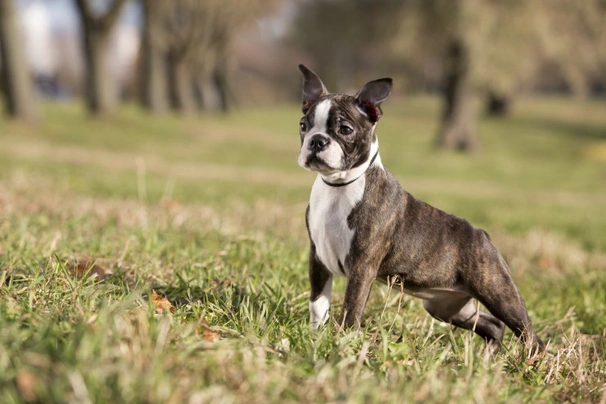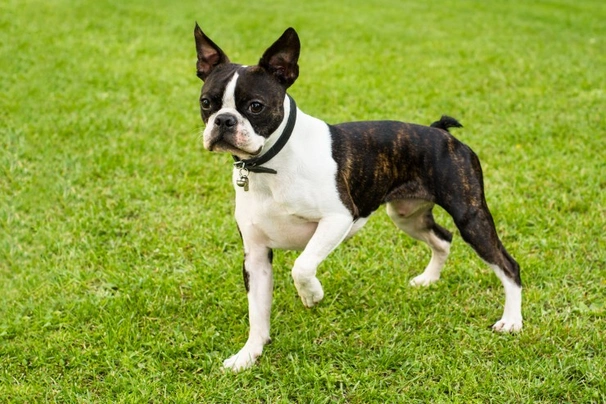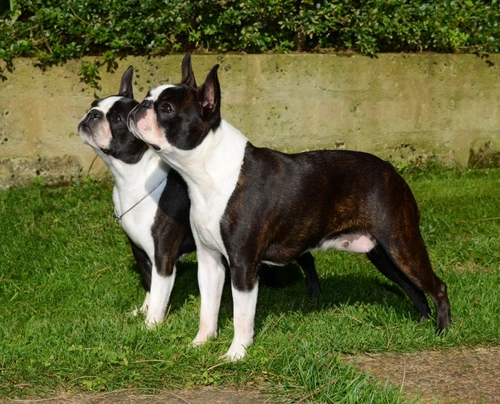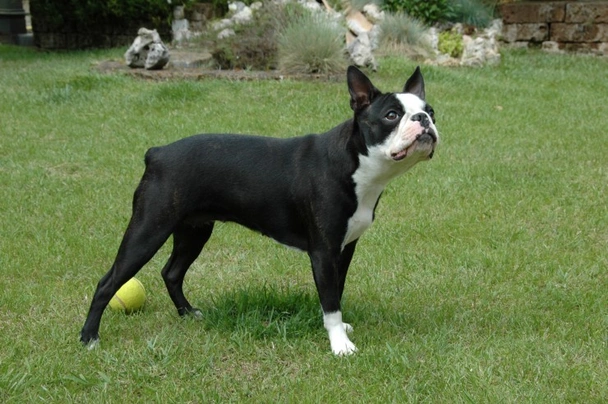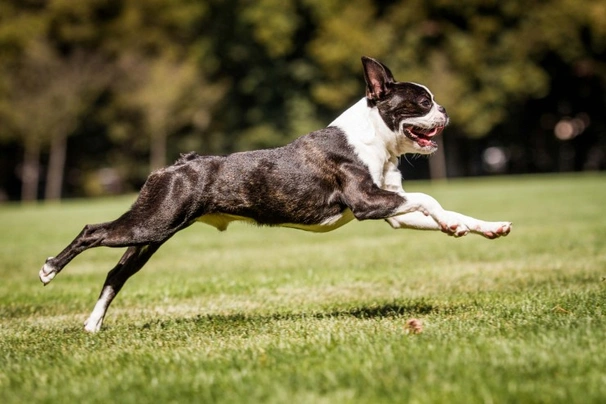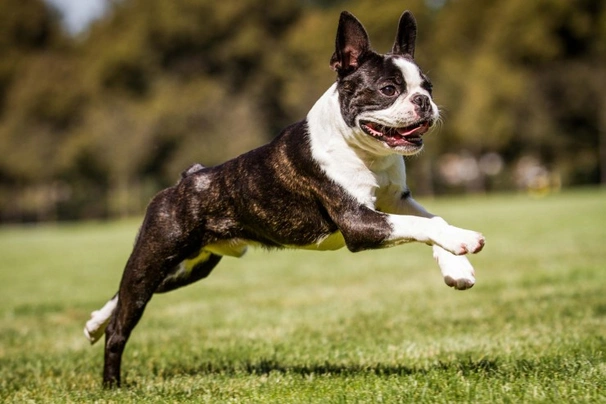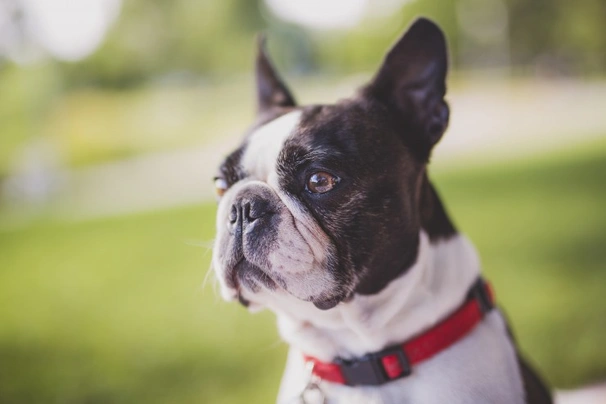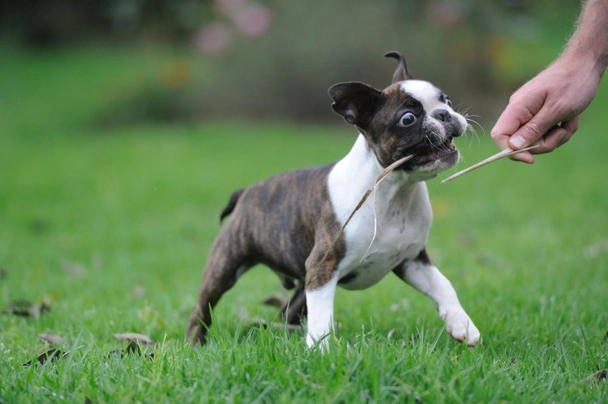Boston Terrier
Pros
Cons
Introduction of the Boston Terrier
The Boston Terrier is often referred to as the "American Gentleman" and for good reason. These smart little dogs boast an interesting ancestry owing some of it to the English Bulldog. The breed first appeared on the scene in the States back in 1893 when various terrier and bull type dogs were crossed. The result saw the first pair of dogs being born and it was these dogs that were to form the foundation stock for the Boston Terrier breed that we know and love today.
Boston Terriers have found their way into the hearts and homes of many owners around the world thanks to their smart looks and their dapper eye catching appeal. These charming little dogs boast a personality that perfectly matches their good looks they are always even tempered which makes them a pleasure to have around with the added bonus being that Boston Terriers are highly adaptable too being just at home living in an apartment in town as they are living in a house in the country.
History of the Boston Terrier
The history of the Boston Terrier varies quite a bit depending on various reference books about the breed but the one constant is that these charming little dogs came to people's attention when a Boston Terrier called Hooper's Judge was first bred and everyone agrees that he was owned by a Mr. R C Hooper. However there's a difference of opinion as to whether Hooper's Judge was imported to the US from England by a man called Mr. William O'Brian who then sold the dog to Mr. Hooper or whether he imported the dog to the States himself.
Mr. Hopper was known to be an enthusiast of English Terrier and English Bulldog crosses which were extremely popular in the UK back in the day. The crosses were especially popular in the mining regions of the country like Liverpool during the 1870's because they were known to be highly intelligent having inherited the best traits of their parent breeds with the added bonus being they were tremendous "ratters". They were also highly prized for their tenacity when used as fighting dogs. The breeds used were typically the Bulldog and the now extinct English White Terrier which were to become the foundation used to develop many other breeds**.**
It is thought that Hooper's Judge was the result of crossing a Bulldog an English White Terrier and a French Bulldog although other crosses were favoured as time went by too. It would be fair to say that back in the day French Bulldogs and Bulldogs did not look like the dogs we see today with the Bulldog being taller and having a longer tail as well as a very undershot jaw and basically a lot lighter build. French Bulldogs were called Toy Bulldogs had a lighter build too. They were taller in the leg than the dogs we know and love today too.
It was in the 1800's that the Boston Terrier first became a firm favourite with the upper classes in a region of Boston known as Beacon Hill. The dogs at the time would be cared for by coachmen most of whom originally went over to the States from England and therefore they were knowledgeable when it came to dog breeding. The result was they often crossed various breeds with or without the consent of their bosses. This led to a smaller type of dog appearing on the scene which very quickly became popular with other breeders back in the day.
Hooper's Judge was a dark brindle Boston Terrier with white markings and he weighed 32lbs. He boasted the character of the Bulldog only he was that much smaller lighter and livelier which are traits inherited from the terrier. His looks and personality quickly found favour with many admirers which led to these small dogs becoming extremely popular in the Boston area and elsewhere around the country.
It is thought that Hopper's Judge only had one mate which was a dog called Burnett's Gyp or Burnett's Kate and she too was a cross between a Bulldog and a Terrier. They produced one puppy that inherited both parent's looks and character being a dark brindle colour and extremely "ugly". The puppy was named Well's Eph and he went on to produce a very handsome puppy called Barnard's Tom a dog that was to become the first to have the physical traits that have become so typical of the Boston Terrier we see today.
Barnard's Tom however was born with a screw tail which breeders back in the day found attractive and this was the beginning of a fad for breeders to produce Boston Terriers with screw tails. Fortunately breeders realised that too much inbreeding would be harmful to the breed and as such they looked to England for other dogs that were of a similar type to "Hooper's Judge". American breeders imported these dogs to the States as a way of introducing new blood into the breed and to prevent too much inbreeding.
The first ever Boston Terrier was shown in Boston in 1888 and was exhibited in a class that was for "Round Headed Bull Terriers of any colour". This led to the breed being known as the Boston Round Head a name that was to stay with the breed for quite a while. Later in 1980 Charles Leland founded the American Bull Terrier Club and he formally applied for the breed to be awarded full recognition by the American Kennel Club a year later. However there was a lot of opposition from many other Bull Terrier Clubs which meant that recognition was delayed. The American Kennel ruled that the breed was not well enough established and that the dogs were not of a "typical" Bull Terrier type.
The ruling inspired breeders to keep records of their breeding practices and frowned on any outcrosses taking place. It was either a Mr. J Watson or a Mr. H Lacey who came up with the name "Boston Terrier" for the breed but this led to The Boston Terrier Club of America being founded and by 1893 when around 75 dogs were registered all of which boasted a 3-generation pedigree.
A second application was made to the American Kennel Club and this time the Boston Terrier was awarded breed recognition. In 1896 a dog called Ch Topsy became the first Boston Terrier to win a Championship and she was a descendent of Barnard's Tom. It was around this time that 40 breeders met with the end goal being to establish a breed standard but it took a while for everyone to agree. A standard was finally set in 1900 but this was revised several times until it was adopted four years later in 1914.
As time passed the smaller dogs became ever more popular but some breeders continued to breed heavier and larger dogs that weighed around 35lbs and only the smaller dogs were to become popular pets. Even during this time it was rare to see two puppies from the same litter with similar looks and colouring with sizes and markings varying tremendously. The breed was however gaining popularity all over the United States with 30 breed clubs being founded in many other states and soon these charming dogs found a fan base in Canada too where further clubs were established.
It was two descendants of Hooper's Judge that were to become the "breed type" for the Boston Terrier with their large round eyes and better shaped heads. They produced extremely good puppies some of which were to become what is referred to as true "greats" within the breed namely Ch Hagerty Kind Heilborn's Raffle and Kid Boots Bostons.
In 1901 the very first Boston Terrier called Mr. Smith's Brindle Beauty was registered in the UK but it was a further 4 years before another dog was registered. The Countess of Essex bought several dogs over to the UK some of which were descendants of Kid's Boots and together with Mrs. McCormick-Goodhart she set about improving the breed's popularity throughout the UK. It was a few years later in 1935 that Lady Essex along with other breed enthusiasts founded the Boston Terrier Club and she was the president of the club until her death in 1955.
Today the Boston Terrier is still as popular in the States as it ever was with many schools universities and clubs having these unique and charming dogs as their mascots. Boston Terriers have also found a very big fanbase in the UK and other countries of the world thanks to their delightful looks and natures.
Interesting facts about the breed
- Is the Boston Terrier a vulnerable breed? No they are among the most popular in the UK and elsewhere in the world
- Bostons were originally bred to be fighting dogs
- The Boston Terrier is the Official State Dog in Massachusetts
- A Boston Terrier called Sergeant Stubby was made a hero in the First World War and was the official mascot for the 102nd Infantry Regiment
- The Boston Terrier was the first non-sporting dog to be bred in the United States
- All too often a Boston Terrier is confused for a French Bulldog
- A lot of Boston Terriers love everyone they meet and don't ever see anyone as a "stranger"
Appearance of the Boston Terrier
Height at the withers: Males 38 - 43 cm Females 38 - 43 cm
Average weight: Males & Females as follows:
Lightweight: under 6.8 kg
Middleweight: 6.8 kg - 9.1 kg
Heavyweight: 9.1 kg - 11.4 kg
Known to be a small affectionate and happy dog the Boston Terrier can also be a little boisterous when the mood takes them. They boast smooth coats with very distinctive markings and colouring. The overall first impression these little dogs put across is one of grace and strength which is paired to a tremendous amount of style.
Their heads are quite square shaped in appearance and flat on top with dogs boasting a well-defined stop and brow. They have a shortish square muzzle right to the tip of their nose. Their nose is black and boasts a very defined line in between their nostrils. Bostons also have nice square broad strong looking jaws. Their eyes are set wide apart and round boasting a dark colour and these lively dogs always have an alert yet kind expression in their eyes but it's also one that shows just how intelligent they are.
Dogs carry their small thin ears upright which are set wide apart on a dog’s head. Bostons have an even bite although their jaw can be slightly undershot which is acceptable as a breed standard. The length of a Boston's neck is in proportion to the rest of their body which these little dogs arch adding to their graceful and debonair appeal.
Their forequarters are strong with sloping shoulders and straight well-muscled legs. The Boston has a muscular body with a nice width to their chest and deep well sprung ribs. Their rump curves slightly giving the impression of a dog having a short body. Their hindquarters are strong looking with well-developed muscular thighs. They boast small round and very compact feet with well arched toes. Their tail is set low and quite short being wider at the base before tapering to the tip. Dogs can either carry their tails straight or curled but never above the level of their back.
When it comes to their coat the Boston Terrier has a very distinctive one that's smooth and short with a natural lustre to it. The hair is fine to the touch but it's their lovely colouring and markings that make the Boston stand out in a crowd with dogs boasting the following as a breed standard:
- Black & White
- Black & White Brindle
- Black Brindle & White
- Brindle
- Brindle & White
- Mahogany & White
- Mahogany Brindle
- Mahogany Brindle & White
- Red & White
- Seal & White
- Seal Brindle
- Seal Brindle & White
It is worth noting that brindle is the preferred breed colour although black is perfectly acceptable too. The ideal markings for a Boston should be as follows:
- Dogs should have a white muzzle
- Dogs should have an even white blaze covering their head their collar breast all or part of their front legs and white below their hocks on their hind legs
Gait/movement
When Boston Terriers move they do with grace and easy. They are extremely sure-footed with both their front and back legs moving straight forwards in perfect rhythm. Every step a Boston Terrier takes show power and grace.
Faults
The Kennel Club frowns on any exaggeration or departure from the breed standard and judge any faults on how much they interfere with a dog's overall health and wellbeing as well as a dog's ability to perform.
Males should have both testicles fully descended into their scrotums and it is worth noting that a Boston Terrier can be a little taller or shorter as well as slightly lighter or heavier than stated in the KC breed standard which is given as a guideline only.
Temperament of the Boston Terrier
Boston Terriers are known for their intelligent and lively personalities. They can be a little strong willed at times which can border on them being stubborn and why it's so important for these little dogs to be well socialised and correctly trained from a young age so they understand what is required of them. Early training also helps establish their place in "the pack" and who is alpha dog in a household reducing the chance of a Boston exhibiting any dominant behaviours.
Male Bostons tend to be a lot more protective and territorial than their female counterparts which is something worth knowing if you are planning to share your home with one of these attractive lively dogs. With this said the Boston Terrier is easy to train because they are so intelligent. The problem is that they tend to form a very strong bond with the person who trains them and this can lead to dogs suffering from separation anxiety which can become a real issue for people who go out to work during the day and who have to leave their pets on their own.
When left to their own devices for long periods of time Boston Terriers can develop all sorts of behavioural problems and this includes excessive barking as well as being destructive around the house. They are a good choice for first time owners providing they understand a Boston's need to be around people and the fact they thrive on human contact. These dogs are a good choice as a family pet in households where one member of the household is around during the day to keep them company so they never have to spend too much time on their own.
Are they a good choice for first time owners?
Boston Terriers are a great choice for first time dog owners because they are so amenable intelligent and loving by nature which in short means they are easy to train.
What about prey drive?
A Boston Terrier is a social dog by nature but they have a high prey drive and will happily chase anything that moves if they get the chance which is why choosing where a dog can run off their leads must be carefully thought through.
What about playfulness?
Boston Terriers are known to be playful and fun-loving characters by nature and remain very puppy-like well into their senior years. They adore taking part in all sorts of interactive games and they are especially good at sporting activities like agility.
What about adaptability?
Boston Terriers are extremely adaptable little dogs being just as happy living in an apartment in town as they are living in a house in the country providing they are given enough mental stimulation and daily physical exercise to prevent boredom from setting in.
What about separation anxiety?
Because Boston Terriers form very strong ties with one person in a household they are better suited to people where the person stays or works from home when everyone else is out to avoid them suffering from separation anxiety. When a Boston does develop separation anxiety it can lead to all sorts of behavioural problems which includes barking incessantly and being destructive around the home.
What about excessive barking?
Boston Terriers are known to like the sound of their own voices which is something that needs to be gently curbed when a dog is still young and even then there is no guarantee that they would not bark just for the sake of it when they feel like it. With this said an unhappy Boston Terrier would be quick to let the world know they are not pleased about something which includes being left on their own for too long.
Do Boston Terriers like water?
Some Boston Terriers adore swimming and will leap in the water whenever they can. However other Bostons don't even like to get their feet wet and it would be a mistake to force a dog into the water because it would just end up frightening them. Care should always be taken when walking a Boston off the lead anywhere near more dangerous watercourses just in case they decide to leap in bearing in mind that because of their shorter noses they have more difficulty breathing should their heads go under the water.
Are Boston Terriers good watchdogs?
Boston Terriers are natural watchdogs although they are never aggressive towards people they have never met before. With this said some Bostons are just too friendly and will greet a stranger as if they are their best friends. In short it really does depend on the dog as to whether they are good watchdogs or not.
Intelligence / Trainability of the Boston Terrier
Boston Terriers need to be well socialised from a young age for them to be confident adult dogs. Their training also needs to start as early as possible but with this said they are very intelligent and always eager and willing to please their owners which means if they are well handled with a firm yet gentle hand the Boston Terrier is easy to train. The key to doing this successfully is to always be consistent and to reinforce the commands these terriers have been taught throughout their lives. The first commands a Boston Terrier should be taught as soon as possible are as follows:
- Sit
- Stay
- Down
- Heel
- Quiet
- Bed
They excel at all sorts of dog sporting activities which includes things like flyball agility rally and obedience. Boston Terriers are also known to be excellent therapy dogs thanks to their sensitive kind and loving natures.
Children and other
Although small in stature the Boston Terrier can be quite boisterous at times so although they generally get on well with children it is always best for any interaction between the kids and a dog to be supervised by an adult to make sure things stay calm and nobody gets knocked over albeit by accident. They are better suited to families where the children as slightly older because of the fact they can be so boisterous when playing around toddlers and smaller kids.
Bostons can be a little aggressive towards other dogs which is why it's so important for them to be well socialised from a young age and introduced to as many new situations people and dogs as possible before they are fully mature. However they should not be trusted around cats and other small animals and pets commonly found in the home which is all due to the fact their "terrier" nature might just get the better of them which could end up being disastrous. With this said if a Boston Terrier is introduced carefully to other animals and if they have grown up with a family cat they generally get on well with them.
Health of the Boston Terrier
The average life expectancy of a Boston Terrier is between 9 and 15 years when properly cared for and fed an appropriate good quality diet to suit their ages.
The Boston Terrier is generally a healthy and robust little dog however they are known to suffer from certain congenital and hereditary disorders which are worth knowing about if you are planning to share your home with one of these lively and often boisterous dogs. The health issues that most affect the breed include the following:
- Patellar luxation otherwise known as dislocated kneecaps
- Early on-set cataracts - Tests available
- Late on-set hereditary cataracts - Tests available
- Hereditary heart defects
- Deafness
- Sinus issues
- Incorrect vertebra development
It is worth noting that The Boston Terrier Club UK holds eye testing services at their Championship show every year and that all breeds are welcome. All responsible breeders do their utmost to ensure they only breed healthy Bostons with even kind temperaments.
What about vaccinations?
All puppies would have been given their first vaccinations but it is up to new owners to make sure they have their follow-up shot in a timely manner. The vaccination schedule for puppies is as follows:
- 10 -12 weeks old bearing in mind that a puppy would not have full protection straight away but would be fully protected 2 weeks after they have had their second vaccination
There has been a lot of discussion about the need for dogs to have boosters. As such it's best to talk to a vet before making a final decision on whether a dog should continue to have annual vaccinations which are known as boosters.
What about spaying and neutering?
Some vets like to spay or neuter Boston Terriers when they are 6 months old whereas other vets prefer to wait a little longer so the procedures are carried out when dogs have developed a little more and are therefore more mature which can be anywhere between 9 to 12 months old.
What about obesity problems?
Most Boston Terriers have healthy appetites which means they are prone to put on too much weight if not given the correct amount of daily exercise. Obesity can shorten a dog's life by several years because it puts vital internal organs under a lot more strain which includes a dog's heart. As such it's essential for owners to keep a close eye on a Boston's waistline and to adjust their daily calorie intake and daily exercise accordingly.
What about allergies?
Some Boston Terriers are more predisposed to developing skin allergies than others and when a dog suffers a flare up finding the triggers can prove frustrating so the sooner a vet can examine a dog the better. It means a dog can be made to feel more comfortable while they investigate what is causing the problem. Typical allergy triggers include the following:
- Environment
- A reaction to certain chemicals commonly found in household cleaning products
- Seasonal allergies which includes pollen and grasses
- Food which includes certain meats and cereals often used as ingredients in commercially produced dog food
- Tick and flea bites
- Dust mites
- Mould
Participating in health schemes
Responsible breeders would always ensure that stud dogs are tested before being used for breeding purposes because it is the only way of reducing the risks of puppies being born with any congenital or hereditary health issues known to affect the breed. There are several schemes available for Boston Terriers which are as follows:
- DNA testing for HC-HSF4 - early onset cataracts - available from the Animal Health Trust based in Newmarket
- Eye Testing through the KC/BVA/ISDS Eye Scheme
What about breed specific breeding restrictions?
Apart from the standard breeding restrictions set in place by the Kennel Club for all recognised breeds currently there are no further breed specific breeding restrictions in place for Boston Terriers.
What about Assured Breeder Requirements?
It is mandatory for all Kennel Club Assured Breeders to have their stud dogs tested using the following schemes and the Kennel Club strongly advises that other breeders follow suit:
Caring for the Boston Terrier
As with any other breed Boston Terriers need to be groomed on a regular basis to make sure their coats and skin are kept in top condition. They also need regular daily exercise to ensure they remain fit and healthy. On top of this they must be fed a good quality diet that meets all their nutritional needs throughout their lives.
Caring for an Boston Terrier puppy
Boston Terrier puppies are incredibly cute and it's all too easy to spoil them because of this. However all puppies need to be taught the ground rules and boundaries from an early age so they not only understand what their owners expect of them but it also helps establish who is the "alpha" dog in a household.
Timing the arrival of a puppy in a home is all-important because someone needs to be around for the first week so that the newcomer never spends too much time on their own which is especially important for breeds like the Boston Terrier a dog that is known to suffer from separation anxiety. A puppy needs a lot of attention and reassurance when they arrive in a new environment having just left their mothers and littermates which can be a stressful time for them.
It's also essential for homes and gardens to be puppy-proofed well in advance of their arrival. This means making sure all electric wires and cables are out of a puppy's reach just in case they decide to chew on them with disastrous results. It's also a good idea to limit the amount of space a puppy can roam in and the best way of doing this is to either invest in a good quality playpen or to fit child gates on doors to prevent a puppy from getting out of a chosen room.
Puppies need to nap a lot for them to grow and develop properly and this can be up to 21 hours a day. As such it's important to set up a quiet area for them to retreat to when they feel like taking a nap in-between boisterous bouts of play. The area should not be too out of the way because a puppy needs to know someone is around and it's important to be able to hear the puppy just in case they get themselves into any sort of trouble and need rescuing.
The documentation a breeder provides for a puppy must have all the details of their worming date and the product used as well as the information relating to their microchip. It is essential for puppies to be wormed again keeping to a schedule which is as follows:
- Puppies should be wormed at 6 months old
- They need to be wormed again when they are 8 months old
- Puppies should be wormed when they are 10 months old
- They need to be wormed when they are 12 months old
Things you'll need for your puppy
Needless to say there are certain items that new owners need to already have in the home prior to bringing a new puppy home. It's often a good idea to restrict how much space a puppy plays in more especially when you can't keep an eye on what they get up to bearing in mind that puppies are often quite boisterous which means investing in puppy gates or a large enough playpen that allows a Boston Terrier puppy the room to express themselves while keeping them safe too. The items needed are therefore as follows:
- Good quality puppy or baby gates to fit on doors
- A good well-made playpen that's large enough for a Boston Terrier puppy to play in so they can really express themselves as puppies like to do
- Lots of well-made toys which must include good quality chews suitable for puppies to gnaw on bearing in mind that a puppy will start teething anything from when they are 3 to 8 months old
- Good quality feed and water bowls which ideally should be ceramic rather than plastic or metal
- A grooming glove
- A slicker brush or soft bristle brush
- Dog specific toothpaste and a toothbrush
- Scissors with rounded ends
- Nail clippers
- Puppy shampoo and conditioner which must be specifically formulated for use on dogs
- A well-made dog collar or harness which is the best choice for Boston Terriers
- A couple of strong dog leads
- A well-made dog bed that's not too small or too big
- A well-made dog crate for use in the car and in the home that's large enough for a Boston Terrier puppy to move around in
- Baby blankets to put in your Boston Terrier's crate and in their beds for when they want to nap or go to sleep at night
Keeping the noise down
All puppies are sensitive to noise including Boston Terrier puppies. It's important to keep the noise levels down when a new puppy arrives in the home. TVs and music should not be played too loud which could end up stressing a small puppy out.
Keeping vet appointments
As previously mentioned all Boston Terrier puppies must be vaccinated before they go to their new homes but it is up to the new owners to make sure puppies get their follow-up shots. The vaccination schedule for puppies is as follows:
- 10 -12 weeks old bearing in mind that a puppy would not have full protection straight away but would only be fully protected 2 weeks after they have had their second vaccination
When it comes to boosters it's best to discuss these with a vet because there is a lot of debate about whether a dog really needs them after a certain time. However if a dog ever needed to go into kennels their vaccinations would need to be
What about older Boston Terriers when they reach their senior years?
Older Boston Terriers need lots of special care because as they reach their golden years they are more at risk of developing certain health concerns. Physically a Boston Terrier will start to have a greying muzzle but there will be other noticeable changes too which includes the following:
- Coats become coarser
- A loss of muscle tone
- Boston Terriers can either become overweight or underweight
- They have reduced strength and stamina
- Older Boston Terriers have difficulty regulating their body temperature
- They often develop arthritis
- Immune systems do not work as efficiently as they once did which means older Boston Terriers are more susceptible to infections
Older Boston Terriers change mentally too which means their response time tends to be slower as such they develop the following:
- They respond less to external stimuli due to impaired vision or hearing
- They tend to be a little pickier about their food
- They have a lower pain threshold
- Become intolerant of any change
- Often an older Boston Terrier can feel disorientated
Living with a Boston Terrier in their golden years means taking on a few more responsibilities but these are easily managed and should include taking a look at their diet the amount of exercise they are given how often their dog beds need changing and keeping an eye on the condition of their teeth.
Older Boston Terriers need to be fed a good quality diet that meets their needs at this stage of their lives all the while keeping a close eye on a dog's weight. A rough feeding guide for older Boston Terriers is as follows bearing in mind they should be fed highly digestible food that does not contain any additives:
- Protein content should be anything from 14 – 21%
- Fat content should be less than 10%
- Fibre content should be less than 4%
- Calcium content should be 0.5 – 0.8%
- Phosphorous content should be 0.4 – 0.7%
- Sodium content should be 0.2 – 0.4%
Older Boston Terriers don't need to be given the same amount of daily exercise as a younger dog but they still need the right amount of physical activity to maintain muscle tone and to prevent a dog from putting on too much weight. All dogs need access to fresh clean water and this is especially true of older dogs when they reach their golden years because they are more at risk of developing kidney disorders.
Grooming of the Boston Terrier
Boston Terriers are easy maintenance on the grooming front all thanks to their short tight coats. However a weekly groom is recommended not only to keep their coats and skin in good condition but it also helps strengthen the bond between dog and owner. Boston Terriers love the one-to-one contact they get when they are being groomed. With this said it's still important to teach puppies that being brushed and having their feet ears and tails touched is a nice experience. This makes it that much easier to trim their nails when needed and to check their ears for any infections which should be done on a regular basis.
Exercise of the Boston Terrier
Boston Terriers are not high-energy dogs but they are lively by nature and therefore they need to be given a minimum of 40 minutes exercise a day for them to stay happy and healthy in body and mind. They also enjoy playing lots of interactive games which is a great way of keeping these little dogs stimulated and to prevent boredom from setting in which can lead to all sorts of unwanted and often destructive behaviours around the home.
They are the perfect choice for people who lead more sedentary lives but it's important to keep an eye on a Boston's weight because without enough daily exercise they are prone to plough on the pounds which can lead to dogs developing weight related health issues which could shorten their lives considerably.
Feeding of the Boston Terrier
If you get a Boston Terrier Puppy from a breeder they would give you a feeding schedule and it's important to stick to the same routine feeding the same puppy food to avoid any tummy upsets. You can change a puppy's diet but this needs to be done very gradually always making sure they don't develop any digestive upsets in the process and if they do it's best to put them back on their original diet and to discuss things with the vet before attempting to change it again.
Older dogs are not known to be fussy or finicky eaters in fact quite the opposite is true with Bostons leaning towards eating just about anything that’s put down in front of them. However this does not mean you can feed them a lower quality diet. It's best to feed a mature Boston Terrier twice a day once in the morning and then again in the evening making sure it's good quality food that meets all their nutritional requirements. It's also important that dogs be given the right amount of exercise so they burn off any excess calories or they might gain too much weight which can as previously mentioned lead to all sorts of health issues. Obesity can shorten a dog's life by several years so it's important to keep an eye on their waistline from the word go.
Feeding guide for a Boston Terrier puppy
Boston Terrier puppies need to be fed a good quality nutritious diet for them to grow and develop properly. As a rough guide puppies should be fed the following amounts every day:
- 2 months old - 48g to 102g depending on puppy's build
- 3 months old - 54g to 118g depending on puppy's build
- 4 months old - 55g to 124g depending on puppy's build
- 5 months old - 55g to 125g depending on puppy's build
- 6 months old - 47g to 124g depending on puppy's build
- 7 months old - 40g to 112g depending on puppy's build
- 8 months old - 39g to 89g depending on puppy's build
- 9 months old - 39g to 100g depending on puppy's build
- 10 months old - 39g to 88g depending on puppy's build
Once a puppy is 11 months old they can be fed adult dog food.
Feeding guide for an adult Boston Terrier
Mature Bostons should be fed a good quality diet that contains all the nutrients they need to stay fit and healthy. As a rough guide an adult dog should be fed the following amounts every day:
- Dogs weighing under 6.8 kg can be fed 80g to 93g depending on activity
- Dogs weighing 6.8 to 9.1 kg can be fed 103g to 144g depending on activity
- Dogs weighint 9.1 kg to 11.4 kg can be fed 125g to 156 g depending on activity
Boston Terrier price
If you are looking to buy a Boston Terrier you would need to pay anything from £700 to over £1000 for a well-bred pedigree puppy. The cost of insuring a male 3-year-old Boston Terrier in northern England would be £23.73 a month for basic cover but for a lifetime policy this would set you back £52.74 a month (quote as of August 2017). When insurance companies calculate a pet's premium they factor in a few things and this includes where you live in the UK and a dog's age and whether they have been neutered or spayed.
When it comes to food costs you need to buy the best quality food whether wet or dry to feed your dog throughout their lives making sure it suits the different stages of their lives. This would set you back between £20 - £30 a month. On top of this you would need to factor in veterinary costs if you want to share your home with a Boston Terrier and this includes their initial vaccinations their annual boosters the cost of neutering or spaying your dog when the time is right and their yearly health checks all of which quickly adds up to over a £1000 a year.
As a rough guide the average cost to keep and care for a Boston Terrier would be between £70 to £100 a month depending on the level of insurance cover you opt to buy for your dog but this does not include the initial cost of buying a well-bred pedigree Boston Terrier puppy.
Buying advice
When visiting and buying any puppy or dog there are many important things to consider and questions to ask of the breeder/seller. You can read our generic puppy/dog advice here which includes making sure you see the puppy with its mother and to verify that the dog has been wormed and microchipped.
Boston Terriers are an extremely popular breed both in the UK and elsewhere in the world which means that well-bred puppies command a lot of money. As such with Boston Terriers there is specific advice questions and protocols to follow when buying a puppy which are as follows:
- Beware of online scams and how to avoid them. You may see online and other adverts by scammers showing images of beautiful Boston Terrier puppies for sale at very low prices. However the sellers ask buyers for money up front before agreeing to deliver a puppy to a new home. Potential buyers should never buy a puppy unseen and should never pay a deposit or any other money online to a seller. You should always visit the pet at the sellers home to confirm they are genuine and make a note of their address.
- As previously touched upon Boston Terriers are among the most popular breeds in the UK. As such there are many amateur breeders/people who breed from a Boston Terriers far too often so they can make a quick profit without caring for the welfare of the puppies their dam or the breed in general. Under Kennel Club rules a dam can only produce 4 litters and she must be between a certain age to do so. Anyone wishing to buy a Boston Terrier puppy should think very carefully about who they purchase their puppy from and should always ask to see the relevant paperwork pertaining to a puppy's lineage their vaccinations and their microchipping
- Breeders and the Kennel Club advise all prospective owners not to be tempted by sellers advertising "rare" coloured Boston Terriers because there is no such thing as a rare coloured Boston.

Top show quality KC Boston pups
£2,000
Rare Boston Terrier Puppies – Rainbow Litter!
£1,600
Amazing Boston Terrier Girls
£1,500
